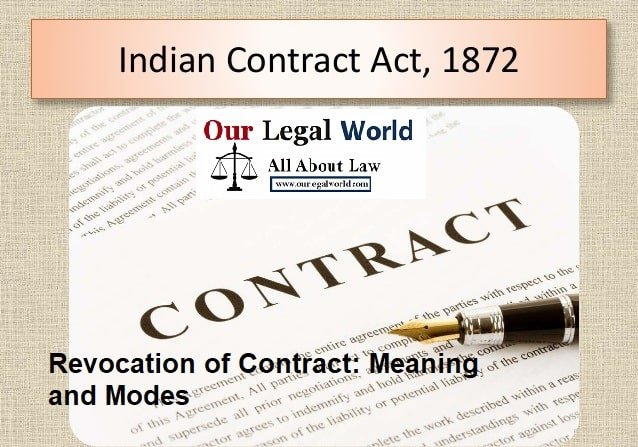Revocation of Contract: Meaning & Modes
Meaning
Revocation means “cancellation” and it is a type of remedy for buyers when the buyer accepts a nonconforming good from the seller.
Section 5 of the Indian Contract Act, lays down the rules of revocation of proposals and acceptances i.e. A proposal may be revoked at any time before the communication of its acceptance is complete as against the proposer, but not afterwards. An acceptance may be revoked at any time before the communication of the acceptance is complete as against the acceptor, but not afterwards[1].
Illustration: Jay proposes, by a letter sent by a post, to sell his house to Veeru and Veeru accepts the proposal. In this case, Jay may revoke his proposal at any time before or at the moment when Veeru posts his letter of acceptance, but not afterwards. And Veeru may revoke his acceptance to any time before or at the moment when Veeru posts his letter of acceptance, but not afterwards.
Modes of Revocation
Section 6 : Revocation how made i.e. this section of the Indian Contract Act, 1872 provides various modes of revocation which are as follows:
1). Notice of revocation
In this case, revocation has to be made before the acceptance. The communication of revocation to be effective must reach the offeree before he mails his acceptance and makes it out of his power. A revocation is effective only when it is brought to the mind of the person to whom the offer is made[2].
In Ramlalsao Gupta v. M.E.R. Malak[3], unfortunately the letter of revocation was reached at wrong address and earlier it was being sent by fax. The court held that the same to be of no effect.
In the case of Henthorn v. Fraser[4], the defendant handed to the plaintiff a detailed note for the sale of the property at 750 euros with the condition that within fourteen days the acceptance should be conveyed to the defendant. Meanwhile that particular offer was considered by another buyer and due to this, next day defendant informed the plaintiff about the withdrawal of the offer and this note reached the plaintiff after 5 pm but by that time plaintiff already responed. The acceptance for the same did not reach to the defendant until the next morning. The court held that the offer was valid and an order for specific performance made for 750 euros to purchase the property. The postal rule in Adam v. Lindsell would apply, which stated that it would be reasonable for acceptance of an offer to take place by post. However, this rule would not apply to the revocation of an offer. Post was a way of communicating offer acceptance, but the acceptance itself is completed as soon as it is posted. This was reasonable to expect since both parties lived in different towns[5].
In Alfred Schonlank & Anr. V. Muthunayana Chetti[6], the defendant offered the plaintiff a sale of indigo proposal and also told him that within eight days he can reply to the proposal. The defendant revoked the offer on the fourth day on the other hand plaintiff on the fifth day accepted the offer. The court held that in case there is no consideration for the promise to keep offer open for a certain time then its nothing but a bare promise only and at the same time these acceptance was of no use in the eyes of laws.
2). Lapse of time
Where an offer says that it shall remain open for acceptance up to a certain date, it has to be accepted within that date. It has been suggested by the Calcutta High Court that in such a case it is enough if the acceptor has “posted the acceptance before the stipulated time”, even if it reaches the offerer after the stipulated date[7].
Where an offer was to last until the end of March and on 28th March, telegram for the acceptance of offer was sent by the offeree but the same was received by the offeror on 30th March. The court held that the acceptance was valid[8].
Where no time is specified within which the offer should be accepted it is a settled principle that the offer must be accepted within a reasonable time[9].
3). By failure to accept condition precedent
Where some preconditions are there for offer before the acceptance is made, it lapses if acceptance is made without fulfillment of the particular condition precedent. In the case of State of West Bengal v. Mahendra Chandra Das[10], a salt lake was offered by way of lease with the condition that on deposit of a sum of money withn a specified period but the defendant even after the expiration of the stipulated time didn’t deposit the sum of money. The court held that this entailed cancellation of the allotment.
Also Read: Discharge of Contract under Indian Contract Act, 1872
4). By death or insanity of offerer
An offer lapse on the death or insanity of the offeror, provided that the fact comes to the knowledge of the offeree before he makes his acceptance[11].
MELISH LJ suggested in the case of Dickinson v. Dodds[12], that after the death of the offeror an offer cannot be accepted. Earlier in the case of Bradbury v. Morgan[13], without the knowledge of the surity’s death, the creditor continued to act on a guarantee. The court held that with the death of the offeror, an offer is not terminated necessarily and the same will open until the offeree comes to know the death of the offeror.
Conclusion
Thus, The Indian Contract Act, 1872 not only provide provisions to enter into the contract but it also provide provisions for the termination of a contract which is entered into by the parties. The provisions and rules of revocation are laid down under section 5 and modes of revocation in section 6 of this respective Act. Overall revocation means “taking back” or it is called as a way of termination of an offer.
References
[1] https://indiankanoon.org/doc/931937/
[2] Avtar Singh, Contract & Specific Relief, Page- 58, 12th Edition, EBC Publishing (P) Ltd.
[3] AIR 1939 Nag 225
[4] (1892) 2 Ch 27
[5] https://www.lawteacher.net/cases/henthorn-v-fraser.php
[6] (1892) 2 MLJ 57
[7] Avtar Singh, Contract & Specific Relief, Page- 66, 12th Edition, EBC Publishing (P) Ltd.
[8] Bruner v. Moore, (1904) 1 Ch 305
[9] https://blog.ipleaders.in/lapse-of-offer/
[10] (1990) 2 Cal LJ 1
[11] Avtar Singh, Contract & Specific Relief, Page- 67, 12th Edition, EBC Publishing (P) Ltd.
[12] (1876) LR 2 Ch D 463, 475
[13] (1862) 1 H&C 249







